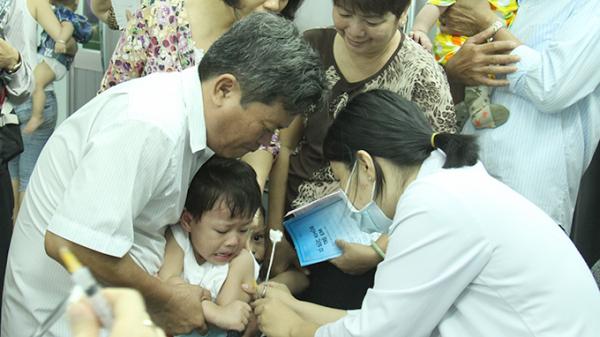A number of Vietnamese people have chosen to take their newborns to neighboring countries for vaccination considering the current dire shortage of local vaccines against childhood diseases.
According to Do Tuan Dat, director of Company for Vaccine and Biological Production No.1 (Vabiotech), demand for vaccines within the first six months of 2014 has risen by at least two or three times compared to the same period of last year.
Even less used vaccines against minor complaints such as chickenpox have also been in short supply since late last year.
Dat’s company imported 25,000 doses of chickenpox vaccines in late April, which now have run out of stock, Dat said, adding that 10,000 doses will be imported by the end of this month.
Nguyen Nhat Cam, director of the Hanoi Preventive Health Center, puts the scarcity of vaccines down to the outbreaks of several diseases, including measles.
Thousands of children have contracted measles and at least 111 have died of the disease since it recurred in Vietnam late last year.
Meanwhile, Quinvaxem, the made-in-Korea vaccine against five deadly childhood diseases, diphtheria (D), tetanus (T), pertussis (P, whooping cough), hepatitis B (HepB), and Haemophilus influenza type b (Hib), was once suspended after at least 15 deaths and dozens of cases of severe allergic reactions among local infants were reported in 2013.
Many local parents have switched to serviced vaccinations, resulting in the deficiency of 5-in-1, 6-in-1 and 3-in-1 vaccines even though Quinvaxem has been re-used since November last year.
There are even not enough vaccines for newborns who come for their second or third vaccinations.
Cam added that 5-in-1 vaccines will not be available until late next month, while he is not sure when 6-in-1 ones will be available again on the market.
To make matters worse, Dat noted that to lure and keep their clients, large hospitals which offer obstetrical services generally “hoard” a large volume of vaccines to make sure babies who are delivered by their facilities are adequately vaccinated.
Concerned about their babies’ health, more and more families have taken their children to neighboring countries for 6-in-1 or 5-in-1 vaccinations.
In mid-June 2014, L.P., of Ho Chi Minh City, took her 4-month-old infant to Singapore for a 6-in-1 shot.
She said that the three-day trip cost her some VND9 million (US$424), excluding accommodations, as they stayed at her friend’s place.
“My baby’s third shot is in this August, if 6-in-1 vaccines aren’t available in Vietnam by that time, I will take her to Singapore again despite the costs,” she sighed.
Meanwhile, H.L., also in HCMC, took her baby to Bangkok, Thailand for a 5-in-1 vaccination.
The hospital offered vaccine packages to infants aged one to 18 months for 9,600 baht ($292), excluding examination fees and other expenses.
L. only paid some VND2 million for one shot.
T.H., also from HCMC, who just took his 6-month-old infant to Singapore for a 6-in-1 vaccination, noted that vaccination in Singapore does not cost much more compared to international hospitals in Vietnam.
Shots range from VND1 to 3 million each.
However, H. paid SG$240 ($188) for one shot including examination fees.
Chau Do, a Vietnamese expat in Singapore, who worked as an interpreter at several hospitals in the city state, noted in recent months an unexpected rise in the number of Vietnamese parents who take their infants there for vaccinations.
People typically go there on weekends, or during business or leisure trips, Do added.
Meanwhile, Assoc. Prof. Phan Trong Lan, head of the HCMC Pasteur Institute, cautioned that though vaccines and vaccination schedules in other countries bear several similarities to those adopted in Vietnam, there are a few differences.
“As vaccines and schedules have been experimentally proved to be suitable for Vietnamese infants, in certain cases, vaccines used in other countries might be inappropriate for disease-causing viruses popular in Vietnam. Differences due to races are also present,” he warned.
Taking newborns on such long trips also considerably increases their risks of getting infected with viruses.
In addition, infants need to be monitored at least 24 hours after immunization for their post-vaccination reactions, which also poses a major difficulty for Vietnamese parents.
Countries also vary in their way to monitor vaccination history, Prof. Lan stressed.
In case of such a vaccine shortage, he strongly advised parents to consult doctors for replacement vaccination schedules.
Like us on Facebook or follow us on Twitter to get the latest news about Vietnam!






















































